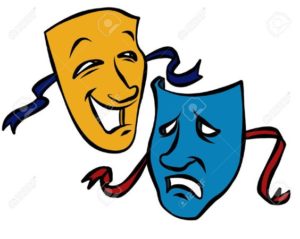This week’s assignment for 6300 Understanding Writing as a Process course is to read and locate ourselves among the range of voices in “Bad Ideas About Genre” from the book Bad Ideas About Writing by Cheryl E. Ball and Drew M. Loewe. I’m drawn to the contribution titled “Excellent Academic Writing Must be Serious” by Michael Theune. The topic interests me because I self-identify as a “creative writer” of non-fiction with a chronic predisposition toward injecting humor into everything I write – even academic discourse!

Incorporating comedy into academic writing is extoled by Theune with the proclamation “…very smart people have been slaying ignorance while slaying audiences by delivering intelligent ideas with comedy’s passion, edge, urgency, and punch for quite some time (Ball and Loewe 181).” He lists over two dozen well-known comedic voices to prove his point. I agree with his take on including humor in academic writing, and I have my own list of humorists whose comedy shaped my funny side.
Theune describes how most teachers approach the issue of humor in academic writing: “Mostly they keep silent on the topic of teaching humorous yet legitimately academic, persuasive writing, and let the Western tradition’s tendency to privilege tragedy carry the big stick (Ball and Loewe 181).” He states “…the instructions about how to do well on high-stakes state-sanctioned writing examinations call for writing that carefully lays its foundations, creates its structure, and establishes its points serious brick by seriouser brick (Ball and Loewe 181).” Theune’s argument has convinced me humor is warranted in academic writing.
An assertion is made by Theune that “Style is often the first element to go when it comes to teaching young writers – in favor of elements such as developing a thesis, supporting that thesis with evidence, and putting a staple in the upper left-hand corner (Ball and Loewe 182).” He made a reference to Gerald Graff, former president of the Modern Language Association with the statement “Graff argues that teachers need to work to connect academic writing courses with ‘students’ youthful argument culture’ (Ball and Loewe 182).” Theune and a growing company of other academics cite comedy as a strong, energetic means to that end.
My assessment of his position on inclusion of comedy in academic writing is that it involves change for teachers who have become entrenched. I’m reminded of threshold concept 5.3 titled “Habituated Practice Can Lead to Entrenchment” in Naming What We Know (Adler-Kassner 77-78). I believe reluctant instructors would be compelled to get a grip, buy a sense of humor if they don’t have one, and embrace change to accomplish Theune’s aim. I say the result would be worthwhile as I refer to researcher Deborah Brandt’s statement in the conclusion of her book The Rise of Writing: Redefining Mass Literacy to reiterate my perspective: “When writing is treated pedagogically in all of its fullness, it engages ethics and a sense of risk and responsibility. It becomes consequential, dramatic, dangerous, demanding, rewarding, and capable of changing self and others (Brandt 166).” Yes!
Adler-Kassner, Linda and Elizabeth Wardle. Naming What We Know: Threshold Concepts of Writing Studies. Boulder: University Press of Colorado, 2016. Print.
Ball, Cheryl E., and Drew M. Loewe, Bad Ideas About Writing, West Virginia U, 2017. Web. 07 Oct. 2018. <https://textbooks.lib.wvu.edu/badideas/badideasaboutwriting-book.pdf>.
Brandt, Deborah. The Rise of Writing. Cambridge: Cambridge UP, 2014. Print.

Arlene,
I tend to agree with your overarching assertion that humor is a warranted element of academic writing. Some of the most memorable academic journals, books, or research papers I’ve invested time in have sustained themselves in my memory because of some unexpected humorous or sarcastic element. I think teachers could definitely benefit from incorporating humor into their pedagogy (I know I will), but I don’t know if it’s always an appropriate element in academic writing.
For example, If I were doing research on some kind of serious topic (let’s say, gender discrimination), I wouldn’t expect it to have a humorous element in it’s rhetorical appeal. That being said, just because texts don’t always adhere to ice-breaking humor doesn’t mean teachers can’t. We can find a way to incorporate humor in our pedagogy while discussing these serious texts to help make students more engaged.
Great post Arlene, I’m expecting you to test out some stand-up material in future class meetings.
Best,
Kelley
Thanks, Kelly; but no thanks on the stand-up…LOL! I’ll see you in class.
Hey Arlene,
First of all, I love the title. I like the whole idea of how academic writing doesn’t always need to be serious. I like your take on it. I think that people can move away from “serious” writing easily in language and tone, and especially any kind of worded imagery or general animated value of their writing. I feel like being informal is somewhat on the rise in academic writing. Creativity is often informal, so this makes perfect sense that a student will express themselves better and more freely in composition by straying away from the formal norms of academic composition. This is all really subtext to everything you’ve said, but I feel like it’s worth mentioning. Thanks for sharing, Arlene.
Also: Para. 2, sentence 1: Extolled with two L’s
Brian
Thank you for sharing your precious knowledge. Just the right information I needed. By the way, check out my website at ZH5 about Outsourcing.